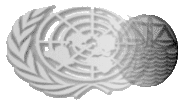|
Monday, 6 June
|
|
Opening
|
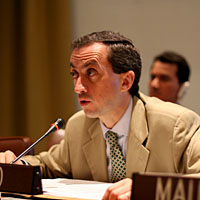
Juan Manuel Gomez-Robledo of Mexico proposed amending the agenda to
indicate that the Consultative Process will forward "issues" rather
than "recommendations" to the General Assembly.
|
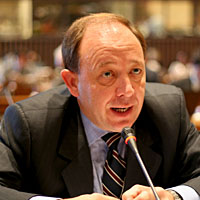
Holger Martinsen of Argentina expressed support for the amendment proposed
by Mexico.
|
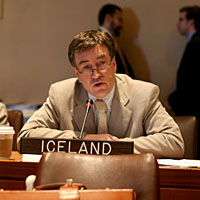
Gunnar Palsson of Iceland agreed with the proposed amendment,
after co-chair Burgess explained it would not result in any changes in
substance.
|
|
Plenary
|
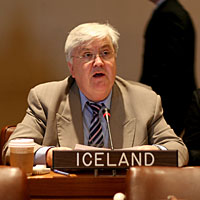
Hjálmar Hannesson of Iceland prioritized full implementation of
existing global instruments before creation of new ones.
|
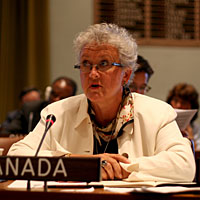
Lori Ridgeway of Canada called for continuation of UNICPOLOS and a
better reflection of its discussions in the report to the General
Assembly.
|
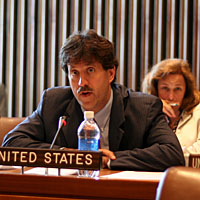
David Balton of the United States called for moving from negotiation to
implementation and noted the need to address, inter alia, an
ecosystem approach to conservation and management of marine resources.
|
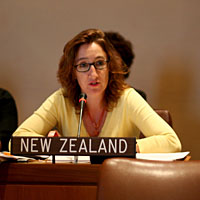
Jane Coombs of New Zealand called on States to cooperate to give effect
to the General Assembly's call for interim targeted bans of destructive
fishing practices in vulnerable areas.
|
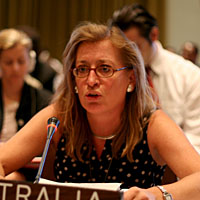
Donna Petrachenko of Australia noted the urgent need for implementation
of the UN Fish Stocks Agreement (FSA) and said derelict fishing gear
heavily impacts marine resources.
|
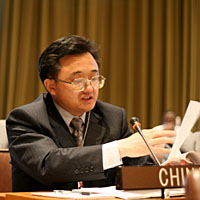
Zhenmin Liu of China stressed the role played by small-scale fisheries
and aquaculture for food security and poverty alleviation in developing
countries.
|
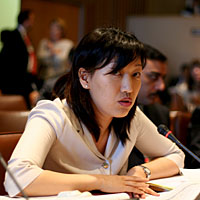
Eun-Ju Ahn outlined the Republic of Korea's national legal instruments
on sustainable fisheries, including a Special Act on Reducing Small-Sized Bottom
Trawlers.
|
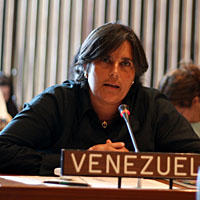
Yenette Vega noted that Venezuela will launch a registry of
fisheries-related data and activities to increase organization
management within the fishing industry.
|
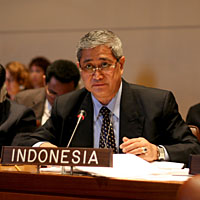
Husni Mangga Barani mentioned Indonesia's joint initiative with the
IMO and the Global Environment Facility (GEF) on a Marine Electronic
Highway to increase the safety of navigation in its area.
|
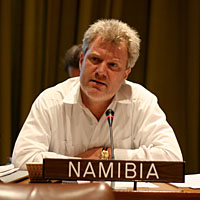
Jens Peter Prothmann of Namibia called for the abolition of subsidies to
the fishing industry and protective trade measures.
|

Kjell Kristian Egge of Norway said a food security approach should be
taken for future fisheries management and called on States that have not
yet done so to become members to the FSA.
|
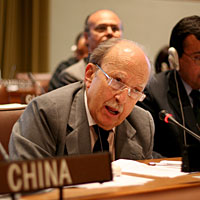
Fernando Zegers Santa Cruz of Chile noted the role of fisheries in food
security, and said urgent steps need to be taken to regulate high seas
fisheries.
|
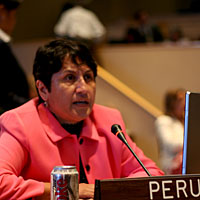
Elvira Velasquez of Peru highlighted the links between fisheries and
poverty reduction, food security and economic development.
|
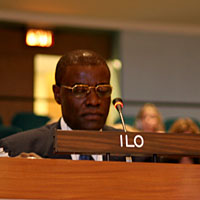
The International Labour Organization called attention to recent
developments in the protection of living and working conditions at sea.
|
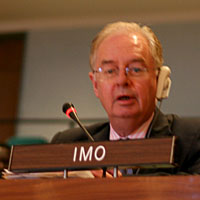
The International Marine Organization noted the globalization of
shipping services, and reported on its Voluntary Member State Audit
Scheme aimed to promote flag States' accountability.
|

Patricio Bernal of the UNESCO International Oceanographic Commission
highlighted its work on, inter alia, the tsunami early warning
system in the Indian Ocean.
|
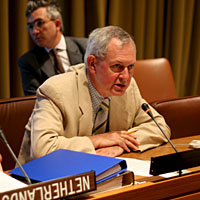
Serge Beslier of the European Commission called for the creation of
additional Regional Fisheries Management Organizations (RFMOs) where
they do not exist.
|
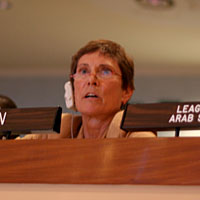
Lee Kimball outlined the World Conservation Union's work on high seas
governance and listed challenges to sustainable fisheries.
|

The International Commission for the Conservation of Atlantic Tunas
indicated that its measures to combat illegal, unreported and
unregulated (IUU) fishing have shown encouraging results.
|
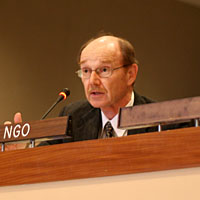
James Spotila of the Sea Turtle Restoration Project drew attention to the
plight of the Leatherback Turtle, and called for a
temporary moratorium on longline fishing in the Pacific.
|
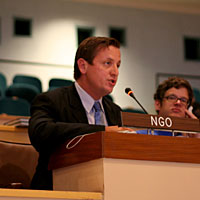
Arlo Hemphill of Conservation International, on behalf of the Deep Sea
Conservation Coalition, outlined steps toward restoring fisheries and
related communities and cultures to healthy sustainable levels.
|
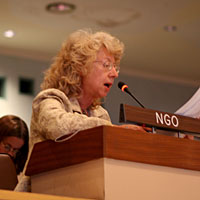
Speaking for a coalition led by the Sierra Club, Marsha Green of
the Ocean Mammal Institute called for reduction of activities that create
intense underwater noise until effective guidelines on marine noise
pollution are developed.
|
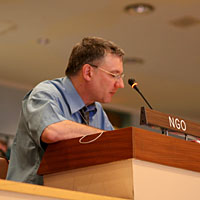
The International Transport Workers Federation highlighted
circumstances that contribute to IUU fishing, including human rights
violations in the fishing industry.
|
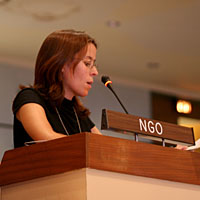
Speaking on behalf of a group of non-governmental organizations, Virginia
Gascón of Greenpeace urged consideration of the social dimension
of sustainable fisheries, to ensure respect for human rights in the
fisheries sector.
|
|
Side Event: Implementing International Agreements and Recommendations
to Protect Deep Sea Biodiversity on the High Seas.
|

The Deep Sea Conservation Coalition held a lunchtime side event which
included three presentations. Dr. Callum Roberts from the University
of York gave a scientific assessment of the impact of bottom trawling
on deep sea habitats and species; Dr. Ellen Pikitch of the UN Millennium
Project's Task Force on Environmental Sustainability presented the
Task Force's main recommendations on how best to achieve MDGs regarding
marine fisheries; and Dr. Monica Verbeek of Seas at Risk offered an
analysis of RFMO experiences and failures in managing deep sea fisheries.
|
|
Discussion Panel on Fisheries and their Contribution to Sustainable
Development
|
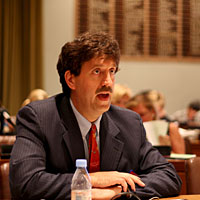
David Balton of the United States presented a report on the outcome of
the fourth round of informal consultations of States Parties to the FSA,
which focused on preparing for a review conference tentatively scheduled
for May 2006.
|
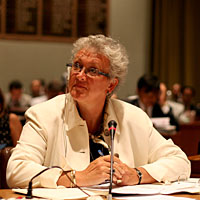
Lori Ridgeway of Canada reported on the Conference on the Governance of
High Seas Fisheries and the FSA and its outcomes, namely a ministerial
declaration and chair's report on presentations and workshops identifying
practical ways forward.
|
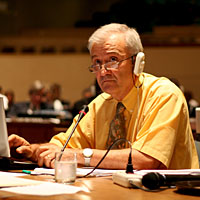
Serge Garcia of the Food and Agriculture Organization provided an
overview of the 2004 Report on the State of Marine Fisheries,
highlighting statistics on the value of the world's fish trade and global
fleet sizes as selected indicators.
|
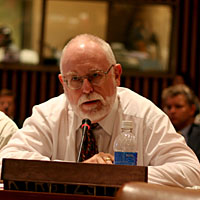
Alastair Macfarlane of the International Coalition of Fisheries Associations
asked about possible reasons for many states having not yet signed the FSA,
and definitions of "fully exploited" fisheries stocks.
|
|

Jane Willing of New Zealand noted that the FAO report dealt with pelagic
species and tunas, and asked about gaps in data pertaining to straddling
stocks.
|

